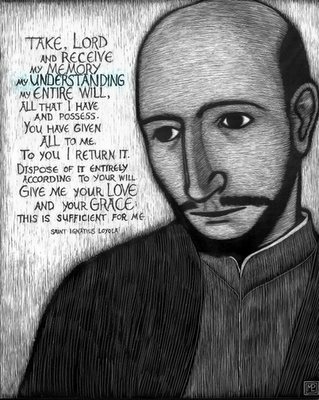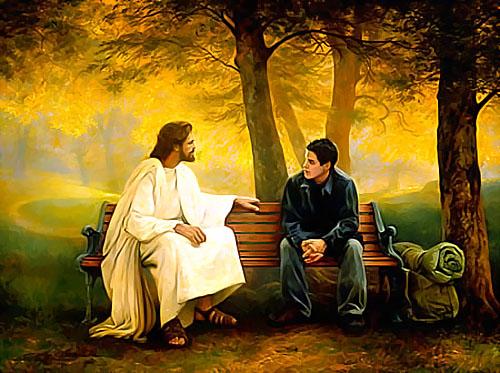
In life’s struggles and moments of suffering, we often ask questions about why a loving God would allow such suffering. We look to Job for answers and name Mystery as a way to let go of an explanation. We acknowledge how Jesus suffers with us, that God knows our pain, does not want it, yet stays with us and shares in our suffering. But what about God sitting with us and sharing in our desires as well?
Ignatian spirituality places great emphasis on desires, and that the deep longings of our heart are shared by God. But what if those longings are never fulfilled? I left religious life because of a deep desire to get married, and I felt that God shared those desires. But what if I had never met someone to marry? How can a loving God share our desires but never make them come to be?
But God’s Confirmed My Desires!
There are many people who discern and pray with the deep desires of their heart. They long to get married, to have children, to become a priest or sister, or to use their talents to better the world. They’ve prayed with these things. They’ve felt God confirm these desires! But they never get married, they never have children, they can’t seem to get accepted to a seminary, or they can’t seem to enter a career that uses their gifts well. Has God abandoned them? Why would God confirm their desires in their prayer and discernment but not bring them to fruition?
Perhaps we need to rethink the way Ignatian spirituality speaks about desire. We assume that if God plants those desires then they will come to be. This brings us to our image of God. Do we expect God to manipulate the world so we can get our desires in the same way we expect God to manipulate the world to eliminate suffering? As Christians we acknowledge that suffering is a reality of life, that it’s often beyond our control. But so is not getting our desires. I cannot control whom I meet or whether I get accepted to a job or university. God does not desire our suffering, but we know that we cannot always escape it. Similarly, can God just share our desires whether or not they happen? I still have desires to be a priest, and I’ve felt God confirm it in prayer, but right now in the Roman Catholic Church I am unable to be both a priest and married. Because I can’t have that desire does that mean it’s not still a desire God shares? Do I expect God to manipulate the world and the free will of those in it?
 It’s About Relationship
It’s About Relationship
It seems like a very hands-off God. God does not always prevent our suffering nor does God always control the world so our deep desires can be fulfilled. What’s the point of God if not a divine Santa Claus?
This is where Ignatian spirituality can offer some insight. Some would say that the foundation of Ignatian spirituality is a relationship with Jesus – a friendship with one who sorrows and delights with us, who loves us in and through our suffering and desire, whatever happens. When Ignatius says that the Creator deals directly with the creature, he’s not speaking about the Creator manipulating reality for us; he’s speaking about a relationship that begins in the heart. God calls our attention to the sorrows of our heart and the desires of our heart, so we know what moves us, how we’re called outside of ourselves toward others, and that it’s natural to want to share our energies in a creative way. But we’re called to continually discern the various desires we have throughout the variations of life’s circumstances. I may not find myself in the career path I had desired, but I can still live my desire to be a good spouse. I may not find a spouse as I had hoped, but I can live my desire to be a generous friend or to positively serve the world through my work. I may not always find a life of perfect comfort or peace, but hopefully that experience will allow me to empathise with those who also struggle in similar ways. There is no one way to be a person of God, and there is certainly no one answer to the mysteries of suffering and desire.
 A New Way
A New Way
In the Ignatian world, when we speak of God sharing our desires, we must be careful not to assume that all those good and holy desires will come to fruition the way we expect them to. I desired to be a priest in religious life so I could minister in the church and help change the world for the better. I left religious life for the desires of marriage because I could not have both. Does that mean my desires for ministry and service (which God confirmed in prayer) were not completely fulfilled? Not at all. It means the desire is producing fruit in a way I didn’t initially expect. All our deep desires are ultimately for God, drawing us closer to God. As my circumstances change and certain realities fall away, I must discern, What now? How can I discover new ways of drawing closer to God in my life?
Sometimes the relief of suffering doesn’t come in a miraculous circumstantial change in our favour, but through the loving presence of a friend, in a way we didn’t initially expect. I may not be able to hear sacramental confessions as a priest (though I desire to), but in spiritual direction I do get to hear people open up their hearts to God before me. I still get to be an instrument of God’s love and healing.
Our deep desires not seeming to be fulfilled is indeed a form of suffering, and we know that with suffering there are no easy answers. It’s always hard. All we must hold on to is that God desires our friendship and invites us to continual growth and new ways to create and love, despite our varied life circumstances.
Related posts:
- Three Spiritual Signals: Desires, Feelings, and Challenges
- Desire & Grace
- Who You Are: Moana’s Call to Discernment
Listen to the podcast version of this post…









Very nice, Andy. I think sometimes the desires are the way God leads us, are a path of sorts. Silly little example: When I was still in California, I went to do laundry one hot summer day. On the way, I stopped by a store to break a $20, but they didn’t have a cold Diet Coke, so I bought something else. I got to the laundromat, which was like a sauna, and the pop machine was out of order. I knew I needed water — or something. As I got in my truck, I remember thinking, I don’t know what you’re up to God, but let me see. At the convenience store where I picked up my Diet Coke, a homeless couple asked for a handout. I took them to Subway & bought them lunch instead. And, then the driven restlessness that had me bouncing around disappeared. I think our desires do the same thing — push us to go places and do things until we do what needs to be done. (Visited any Episcopalian or Lutheran churches lately?)
Andy, You continue to serve God as you have blessed me (and many others I’m sure) with your words. Priest or not, you anoint with your discernment. Many blessings!
So maybe God is saying then yes I share your desires and I’ve confirmed that they are good and you need to stand up against the church and all its ignorance and rules that I have nothing to do with. Maybe God is calling you to make changes or at least speak out in favor of change so that your desires may come true and the desires of other people won’t go unmet because of institutional evil.
Look at what’s going on with the school shootings. It took a bunch of kids to get loud and stand up and make change happen when we’ve had adults who are incapable of doing it for so long. Sitting by and being silent and passive and comfortable and grieving and mourning and wishing things were different then saying that God wishes things were different too and he suffers with you is nice but it’s only half of the equation.
Interesting article… I often talk about desires of our hearts when I train people to think differently in my business… I come across many who have the desire to do something different, but are too afraid to take the next step because they believe that if they move forward towards their heart’s desire to create more in their life, it will be selfish and they feel guilty. Therefore, as a Christian, and a business mentor, I try to remind that if they have the desire, it is not selfish when “God gives desires ” of our hearts… And then there is a challenge – like you say , often it doesn’t come about the same way the person imagined and some don’t stay committed to the course. I always feel sad when people give up on their dreams, for both reasons: not stepping into creating that fulfilment of desire for better life because of gilt and also giving up after starting on the journey and not seeing their “desire” to be fulfilled in the way they imagine… Thank you for sharing your thoughts Andy!
Thank you for this insightful and affirming article.
Once again, I am moved by your compelling reflection; it speaks to me deeply. I’m content to know that even if my desire didn’t get realised, after I’ve done all I could, having God sit and mourn with me as a friend is more than I could ask for. I like the idea that desire pushes me to find other ways of serving others. A deep longing towards something allows one to creatively explore. For isn’t God, the Creator, also the Creative One?
Hello, I just read your lovely comment. What made me think were your last words, “I think our desires do the same thing — push us to go places and do things until we do what needs to be done.” Thanks so much 🙂